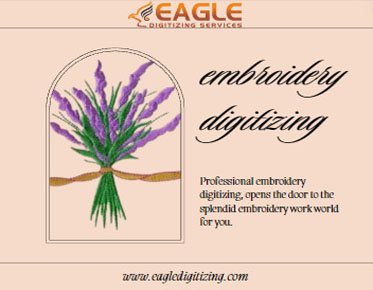Hunting for the Ultimate Embroidery Digitizer?
Embroidery digitization is a crucial
step in bringing your designs to life through stitching. But where do you find
the best digitizer for your project? Let's explore various avenues where you
can discover skilled digitizers who can turn
your visions into embroidered reality.
Understanding
the Role of an Embroidery Digitizer
What is
an Embroidery Digitizer?
An embroidery digitizer is a skilled
professional who transforms digital artwork into stitch files that embroidery
machines can interpret. They meticulously map out each stitch, determining the
stitch type, density, and direction to create a design that translates
seamlessly onto fabric.
Importance
of Finding a Skilled Digitizer for Quality Results
The expertise of a digitizer directly impacts the quality of your embroidered designs. A skilled digitizer understands
the nuances of embroidery software, possesses an eye for detail, and can
optimize designs for different fabrics and stitching techniques. Finding the
right digitizer ensures that your embroidered creations meet your expectations
and stand out with precision and clarity.
Online
Platforms for Freelance Embroidery Digitizers
Overview
of Freelance Websites for Hiring Digitizers
Freelance platforms like Upwork, Fiverr, and Freelancer offer a
plethora of talented digitizers ready to take on your embroidery projects.
These platforms allow you to browse through profiles, portfolios, and reviews
to find a digitizer whose skills and style align with your needs.
Pros
and Cons of Hiring Freelancers for Embroidery Digitization
While freelancers offer flexibility and diverse skill sets, working with them may come with uncertainties regarding quality consistency and project timelines. However, by thoroughly vetting candidates and establishing clear communication channels, you can mitigate potential risks and find a reliable freelancer for your digitization needs.
Embroidery
Digitizing Companies
Introduction to Companies Specializing in Digitization Services
Embroidery digitizing companies are dedicated teams of professionals
equipped with industry-leading software and expertise. These companies offer
comprehensive digitization services, from basic logo conversions to complex
custom designs, ensuring consistent quality and timely delivery.
Benefits of Working with Professional
Digitizing Companies
Collaborating with digitizing companies provides access to a pool of experienced digitizers, quality assurance processes, and streamlined project management. Additionally, companies often offer scalable solutions, accommodating varying project sizes and turnaround requirements with ease.
Embroidery
Forums and Communities
Utilizing Online Forums and Communities for
Recommendations
Embroidery forums and online communities serve as valuable resources
for seeking recommendations and insights from fellow enthusiasts and
professionals. Platforms like Reddit's r/Embroidery and embroidery-specific
forums offer a wealth of knowledge and firsthand experiences to guide your
search for a reputable digitizer.
Engaging with Fellow Enthusiasts for Digitizer
Referrals
Engage actively in discussions, ask questions, and seek referrals from community members who have experience working with digitizers. Their recommendations and insights can steer you towards trustworthy digitizing services and help you avoid potential pitfalls in your search.
Embroidery
Supply Stores and Shops
Exploring
Local and Online Embroidery Supply Stores
Local and online embroidery supply stores often collaborate with
digitizers or offer in-house digitization services. Reach out to these
establishments to inquire about their digitization offerings and seek
recommendations for skilled digitizers they trust and endorse.
Inquiring
About Digitization Services Offered
When visiting embroidery supply stores, inquire about the digitization services they provide, including pricing, turnaround times, and sample work. Establishing a rapport with store staff can lead to valuable referrals and insights into the local embroidery community.
Word-of-Mouth
Recommendations
Asking
Peers, Colleagues, and Fellow Embroiderers for Recommendations
Word-of-mouth recommendations from peers, colleagues, or fellow
embroiderers can be invaluable in your search for a reliable digitizer. Reach
out to your network and inquire about their experiences with digitizers,
requesting referrals based on their satisfaction and results.
Leveraging
Personal Networks for Trusted Referrals
Tap into your personal and professional networks, including friends, family, and industry contacts, to gather recommendations for skilled digitizers. Personal referrals often come with firsthand insights and testimonials, providing a level of trust and assurance in your selection process.
Social Media Platforms and Groups
Joining Embroidery and Craft Communities on
Social Media
Social media platforms such as Facebook, Instagram, and Pinterest host
vibrant communities of embroidery enthusiasts and professionals. Join relevant
groups, follow embroidery hashtags, and engage with posts to connect with
digitizers and seek recommendations from the community.
Seeking Recommendations and Reviews from Group
Members
Post inquiries and requests for digitizer recommendations in embroidery groups and forums, inviting members to share their experiences and suggestions. Be specific about your project requirements and preferences to receive targeted recommendations tailored to your needs.
Embroidery
Industry Events and Conferences
Attending
Trade Shows and Events in the Embroidery Industry
Embroidery industry events, trade shows, and conferences provide
opportunities to network with digitizers, suppliers, and professionals in the
field. Attend seminars, workshops, and networking sessions to connect with
experienced digitizers and gather insights into industry trends and best
practices.
Networking
with Digitizers and Professionals in the Field
Engage in conversations with digitizers, exhibitors, and industry experts during events, exchanging contact information and discussing your digitization needs. Establishing personal connections and rapport can lead to fruitful collaborations and partnerships in your embroidery endeavors.
Online
Reviews and Testimonials
Importance of Reading Previous
Client Reviews and Testimonials
Online reviews and testimonials offer valuable insights into the
reputation, reliability, and quality of digitizer services. Before engaging a
digitizer, take the time to research and read reviews from previous clients to
gauge their satisfaction levels and overall experience. Platforms like Google
My Business, Yelp, and specialized embroidery forums often feature candid
reviews that can inform your decision-making process.
Using
Review Platforms to Evaluate Digitizers' Reputation and Quality
Utilize online review platforms to assess digitizers' reputation and track record of delivering quality work. Look for consistent positive feedback regarding communication, professionalism, and the accuracy of digitized designs. Pay attention to any recurring themes or concerns raised by multiple reviewers.
Checking
Digitizer Portfolios
Reviewing
Digitizers' Portfolios and Sample Work
Before committing to a digitizer, review their portfolio and sample
work to evaluate their skill level, style, and attention to detail. Look for
diversity in projects, ranging from simple logo digitizations to intricate custom designs, to assess their versatility
and proficiency across different embroidery techniques.
Assessing
Skills and Style Compatibility with Your Project Needs
Consider whether the digitizer's style and aesthetic align with your project requirements and brand identity. Evaluate their ability to capture fine details, maintain crisp lines, and optimize designs for various fabric types and stitch densities. Choose a digitizer whose work resonates with your vision and expectations.
Factors
to Consider When Choosing a Digitizer
Quality
of Workmanship and Attention to Detail
Prioritize digitizers who demonstrate a high level of craftsmanship
and meticulous attention to detail in their work. Look for clean, well-defined
stitches, smooth transitions between colors, and accurate replication of
intricate elements in their digitized designs.
Turnaround
Time and Availability for Projects
Consider the digitizer's turnaround time and availability to ensure that they can accommodate your project timeline and deadlines. Clarify expectations regarding project milestones, revisions, and delivery schedules upfront to prevent any misunderstandings or delays.
Communication
and Customer Service
Importance
of Clear Communication and Responsive Customer Support
Effective communication is key to a successful collaboration with a
digitizer. Choose a professional who communicates clearly, responds promptly to
inquiries, and maintains open lines of communication throughout the
digitization process. Clear communication fosters transparency, reduces errors,
and ensures alignment with your project goals.
Evaluating Digitizers' Communication Skills
and Responsiveness
Assess the digitizer's communication skills and responsiveness during initial interactions and correspondence. Pay attention to their willingness to listen to your input, address any concerns or questions you may have, and provide regular updates on the progress of your project.
Pricing
and Cost Estimates
Understanding
Pricing Models for Embroidery Digitization Services
Different digitizers may employ varying pricing models for their
services, including flat rates, per-thousand-stitch pricing, or hourly rates.
Understand the pricing structure and factors that may influence the final cost,
such as design complexity, rush orders, and additional revisions.
Obtaining
Quotes and Estimates from Potential Digitizers
Request quotes and estimates from potential digitizers, detailing the scope of your project, desired turnaround time, and any specific requirements or preferences you have. Compare pricing options and consider the overall value offered by each digitizer in relation to their quality of work and customer service.
Technical
Proficiency and Software Expertise
Assessing
Digitizers' Proficiency with Embroidery Software
Choose a digitizer who demonstrates proficiency with embroidery
digitizing software, such as Wilcom, Hatch, or Pulse. Verify their familiarity
with the features and tools of the software, as well as their ability to
optimize designs for different machine types and file formats.
Compatibility
with Your Machine and File Formats
Ensure that the digitizer's output is compatible with your embroidery machine and preferred file formats, such as .dst, .pes, .exp, or .jef. Discuss any specific machine requirements or file format preferences you have to avoid compatibility issues during production.
Customer
Satisfaction and Feedback
Reviewing
Client Testimonials and Satisfaction Ratings
Prioritize digitizers with a track record of satisfied clients and
positive testimonials. Seek out reviews and feedback from previous customers to
gain insight into their experiences, satisfaction levels, and the overall
quality of service provided by the digitizer.
Assessing
Digitizers' Track Record of Happy Customers
Look for evidence of consistent customer satisfaction and repeat business, indicating a digitizer's reliability, professionalism, and ability to meet or exceed client expectations. A history of positive reviews and referrals is a strong indicator of a digitizer's commitment to excellence and client satisfaction.
Flexibility
and Adaptability
Ability
to Handle Complex Designs and Custom Requests
Choose a digitizer who demonstrates flexibility and adaptability in
handling complex designs, custom requests, and unique project specifications.
Assess their willingness to accommodate special requests, revisions, and
creative input to ensure a collaborative and tailored approach to your
digitization needs.
Willingness
to Incorporate Feedback and Make Revisions
Collaborate with a digitizer who values feedback and is receptive to making revisions based on your input and preferences. Effective communication and a willingness to iterate on designs ensure that your vision is realized and that the final product meets your expectations and requirements.
Guarantees
and Revisions Policy
Understanding
Digitizers' Policies on Revisions and Satisfaction Guarantees
Clarify the digitizer's policies regarding revisions, satisfaction
guarantees, and recourse options in the event of dissatisfaction with the final
product. Ensure that you have a clear understanding of the terms and conditions
governing revisions, turnaround times, and any associated fees or charges.
Ensuring
Peace of Mind with Flexible Revision Options
Choose a digitizer that offers flexible revision options and stands behind its work with a satisfaction guarantee. Having the assurance that revisions will be made promptly and to your satisfaction provides peace of mind and confidence in the digitization process.
Contractual
Agreements and Terms
Importance of Clear Contractual Agreements for
Project Scope and Deliverables
Before initiating work with a digitizer, establish clear contractual
agreements outlining the project scope, deliverables, timelines, and payment
terms. Ensure that all parties are in agreement on the terms and conditions
governing the digitization project to prevent misunderstandings or disputes
later on.
Reviewing
Terms and Conditions Before Initiating Work
Carefully review the digitizer's terms and conditions, paying close attention to clauses related to copyright ownership, usage rights, and confidentiality agreements. Seek clarification on any ambiguous or unclear terms to ensure mutual understanding and compliance with contractual obligations.
Finalizing
Your Decision
Weighing
the Pros and Cons of Different Digitization Options
Consider all factors, including quality, communication, pricing, and
customer satisfaction, when making your final decision. Evaluate the pros and
cons of each digitization option against your project requirements and
priorities to determine the best fit for your needs.
Making
an Informed Decision Based on Your Project Requirements
Ultimately, choose a digitizer that aligns with your project vision, values, and expectations and offers the expertise, reliability, and quality assurance needed to bring your designs to life. By conducting thorough research, communicating effectively, and evaluating all available options, you can confidently select the best embroidery digitizer for your project.
Embarking on an embroidery project requires careful consideration and
planning, especially when selecting the right digitizer. By exploring various
avenues, evaluating key factors, and making informed decisions, you can find
the best embroidery digitizer for your needs and set the stage for a successful
and satisfying embroidery journey. With the support of a skilled and reliable
digitizer, such as Eagle Digitizing, a premier embroidery digitizing company, you can bring your creative visions to fruition and
achieve stunning results that exceed your expectations.



